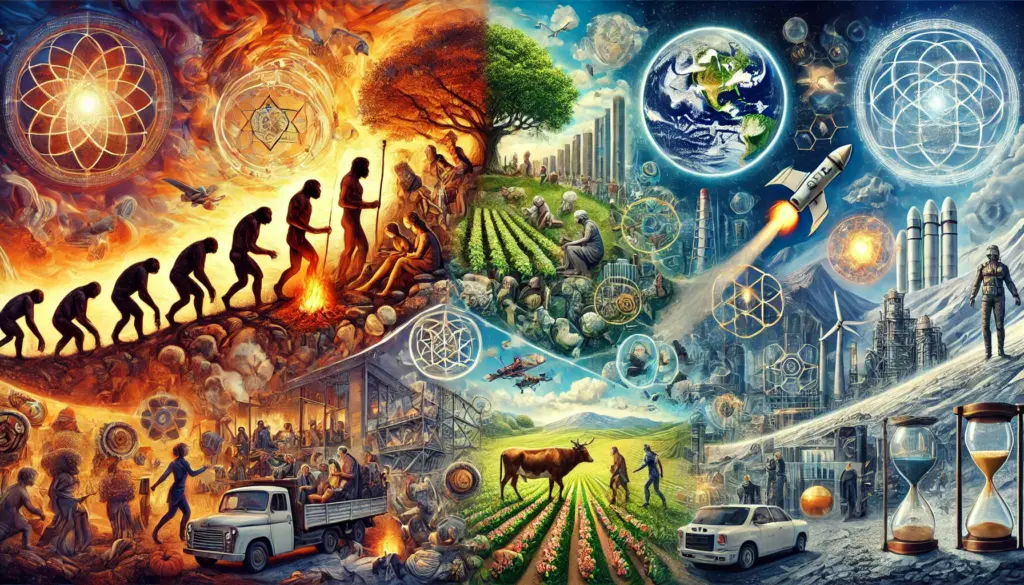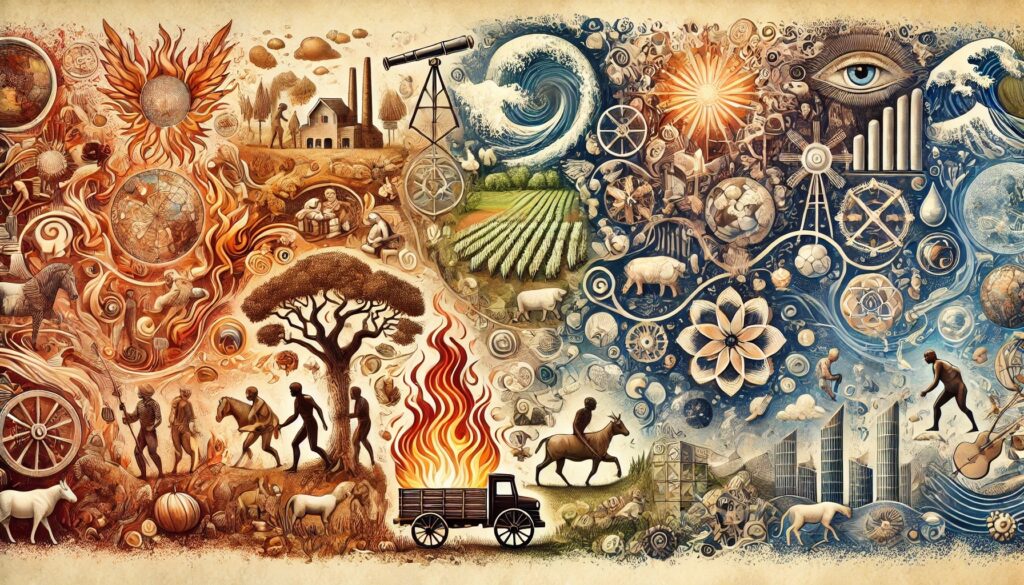
ChatGPT:
Expanded Summary of “Sapiens: A Brief History of Humankind” by Yuval Noah Harari
Yuval Noah Harari’s “Sapiens” offers a sweeping overview of human history, examining how our species, Homo sapiens, evolved from insignificant animals into the most dominant force on Earth. The book is divided into four main parts, which cover the Cognitive Revolution, the Agricultural Revolution, the Unification of Humankind, and the Scientific Revolution. Harari intertwines biology, history, and sociology to show how humans have come to shape their environment and each other, creating complex societies, ideologies, and technologies that define the modern world. Here’s a deeper exploration of the ideas presented throughout the book.
🧠 The Cognitive Revolution (70,000 Years Ago)
The Cognitive Revolution refers to the point in human history when Homo sapiens gained the ability to think and communicate in complex ways. This happened around 70,000 years ago and marked a fundamental shift that allowed humans to leap ahead of other species. Harari argues that the development of sophisticated language was the key differentiator. This unique language enabled Homo sapiens to share detailed information, communicate abstract ideas, and construct social myths and narratives.
These shared narratives were a game-changer. Unlike physical constraints on group sizes among other animals, shared beliefs allowed humans to cooperate in large numbers, far beyond the family or tribal level. This cooperation was essential to forming tribes, religions, and eventually empires. Harari uses examples such as religion, nations, and corporations to illustrate how our capacity for abstract thought—particularly the ability to believe in things that do not physically exist—became the bedrock of society.
🌾 The Agricultural Revolution (12,000 Years Ago)
The Agricultural Revolution occurred roughly 12,000 years ago, when humans shifted from being hunter-gatherers to agriculturalists. This was a major turning point that fundamentally changed the way people lived. Farming allowed humans to produce surplus food, leading to the formation of villages, towns, and eventually cities. The surplus also gave rise to different social roles, including ruling elites and specialized laborers, creating distinct hierarchies that reshaped social dynamics.
However, Harari challenges the common assumption that the Agricultural Revolution improved the quality of human life. He refers to it as “history’s biggest fraud,” pointing out that the average person’s quality of life may have actually declined compared to their hunter-gatherer ancestors. While agriculture allowed human populations to grow, it also led to increased labor intensity, more disease, worse diets due to reliance on limited crops, and less leisure time. Essentially, humans traded the freedom and diverse diet of hunting and gathering for the stability—and often the monotony—of farming.
🌍 The Unification of Humankind
As societies became larger and more complex, the ability to organize many people became increasingly important. Harari discusses how three major forces—money, empires, and religion—played crucial roles in unifying humankind.
Money: Harari describes money as a universal language that transcended cultural barriers, allowing diverse groups of people to trade and cooperate effectively. Money is a powerful “shared myth” that generates trust between strangers. The belief in the value of currency enabled large-scale commerce and economic integration, fostering cultural and technological exchange across continents.
Empires: The rise of empires was another unifying force. Harari argues that empires were not purely oppressive; they also fostered cultural exchange, law, infrastructure, and new technologies. Empires often spread religions, ideologies, and trade networks, which contributed to the broader integration of diverse peoples. Harari shows how empires both destroyed and created; they conquered, but they also fostered cooperation, ultimately integrating various cultures under a single political system.
Religion: Religion served as a powerful force in uniting large groups of people under a common ideology. Religions like Christianity, Islam, and Buddhism helped integrate societies by providing shared values and ethics. Harari emphasizes how the emergence of “universal religions” allowed for wider social cohesion, facilitating the development of larger communities that transcended local or tribal identities.
🔬 The Scientific Revolution (500 Years Ago)
Harari considers the Scientific Revolution, beginning around 500 years ago, as one of the most transformative events in human history. Unlike previous belief systems, the Scientific Revolution was characterized by the willingness to acknowledge ignorance and the pursuit of knowledge through observation and experimentation. This shift in mindset allowed humans to discover new technologies, reshape societies, and even redefine their roles within the universe.
The Scientific Revolution also laid the groundwork for capitalism. Harari explains that the pursuit of new knowledge required significant funding, which led to partnerships between scientists and the wealthy elite. The resulting discoveries accelerated human development, from Newton’s laws of physics to antibiotics. This pursuit of knowledge transformed everything, from daily life to warfare, creating both opportunities and threats.
Industrial Revolution: The technological advances of the Industrial Revolution amplified the impact of the Scientific Revolution. With machines powered by coal, steam, and eventually electricity, production rates soared, enabling mass production and consumer societies. The Industrial Revolution also led to the emergence of new social classes and urbanization, completely reshaping the human experience. However, it came with consequences—namely, environmental degradation, exploitation of labor, and loss of biodiversity.
🤖 The Modern Era and Beyond
Harari concludes the book by discussing the developments that are currently reshaping humanity and might define its future, especially in the fields of biotechnology and artificial intelligence. Advances in these areas pose new ethical dilemmas. Humans now have the power to genetically engineer organisms, potentially even themselves, fundamentally altering the future of life.
He also discusses how economic growth, driven by capitalism, has become a primary goal of modern societies, often at the expense of human happiness and ecological balance. Harari raises critical questions about whether we are happier now than our ancestors were, suggesting that material wealth does not necessarily equate to well-being.
Happiness: Despite all the revolutions that have transformed human life, Harari ultimately questions whether humans today are any happier than they were in prehistoric times. Although modern technology and medicine have brought many conveniences and improved health outcomes, they have also introduced new stresses and anxieties. Humans are still grappling with fundamental questions about the meaning of life and what constitutes true happiness.
🌱 Ethical and Philosophical Questions
Harari closes with thought-provoking reflections on the future of humanity. If humans are now capable of redesigning not just the environment but also themselves, what kind of species do we want to become? He explores the concept of Homo sapiens evolving into “Homo deus”—humans with god-like abilities to manipulate life itself.
The book suggests that the very qualities that enabled humans to dominate the Earth—such as our ability to create myths and pursue goals—also have the potential to lead us towards dangerous paths. Biotechnology, genetic engineering, and artificial intelligence could either represent the next step in our evolution or pose existential threats. As we move forward, Harari urges a more considered reflection on our choices, highlighting the need for wisdom in wielding such power.
📝 Summary Recap
- Cognitive Revolution: Around 70,000 years ago, humans gained the ability for complex communication and abstract thinking, which allowed for large-scale cooperation.
- Agricultural Revolution: Transition to agriculture brought social hierarchies and settled life but led to increased labor and disease, challenging the notion of progress.
- Unification Forces: Money, empires, and religion helped unify human societies by enabling cooperation on a larger scale.
- Scientific Revolution: The pursuit of knowledge drove technological advances and reshaped societies, leading to modern scientific and capitalist systems.
- Industrial and Technological Changes: The Industrial Revolution brought mass production, urbanization, and technological growth, but also introduced challenges like inequality and environmental harm.
- Future Technologies: Biotechnology and AI are reshaping humanity, creating opportunities but also new ethical and existential challenges.
- Happiness and Meaning: Harari questions whether humans today are any happier than their ancestors, highlighting the gap between material success and true well-being.
“Sapiens” offers a broad lens on human history, exploring how each revolution brought humanity closer to its current state but also highlighting the costs associated with these changes. Harari urges readers to reflect on the direction we are heading, emphasizing the need for cautious and informed decision-making as we face the future.
FAQs
1. What are the main themes of “Sapiens” by Yuval Noah Harari?
The book explores several major themes: the Cognitive Revolution, the Agricultural Revolution, empire building, the Scientific Revolution, capitalism, and humanity’s pursuit of happiness. It questions the impact of progress on human well-being and examines the myths that bind societies.
2. How does Yuval Noah Harari describe the Cognitive Revolution?
Harari describes the Cognitive Revolution as a turning point about 70,000 years ago when humans developed the capacity for complex language and abstract thought. This ability enabled early humans to create shared myths, which facilitated the formation of larger, cooperative social groups and complex societies.
3. What impact did the Agricultural Revolution have on human society?
The Agricultural Revolution led to the establishment of permanent settlements, food surplus, and the development of hierarchies. While it increased productivity, it also resulted in harder labor, increased population densities, disease spread, and social inequality.
4. Why does Harari focus on the concept of “shared myths”?
Harari argues that shared myths—such as religions, ideologies, nations, and even money—are essential for large-scale human cooperation. These myths help unite large groups of people under common beliefs, enabling them to function together in complex societies.
5. How did the Scientific Revolution change humanity’s trajectory?
The Scientific Revolution, which began about 500 years ago, transformed humanity by promoting empirical inquiry and technological innovation. It allowed humans to gain unprecedented control over nature and set the stage for industrialization, improved medicine, and advances in all fields of knowledge.
6. What role does capitalism play in Harari’s narrative?
Capitalism is presented as a powerful force driving economic growth and innovation. Harari explores both the benefits—such as technological progress and increased wealth—and the drawbacks, including social inequalities and the exploitation of labor and natural resources.
7. How does Harari view the Industrial Revolution?
Harari sees the Industrial Revolution as a significant leap that increased productivity, urbanization, and technological progress. However, he also points out its negative effects, like environmental degradation and the exploitation of workers, which continue to shape modern society.
8. Does Harari believe human beings are happier now than they were in the past?
Harari questions whether modern progress has truly increased human happiness. He contrasts the uncertainty and stress of contemporary life with the more straightforward existence of hunter-gatherers, suggesting that advancements may not have led to greater overall happiness.
9. What is Harari’s perspective on biotechnology and artificial intelligence?
Harari suggests that biotechnology and artificial intelligence represent the next major changes for humankind. These technologies have the potential to reshape human life, extending beyond medical applications to potentially altering what it means to be human, raising ethical and existential questions.
10. What does “Sapiens” imply about the future of humanity?
Harari is cautious about the future, highlighting both the immense potential and the risks posed by scientific and technological advances. He warns that humanity’s power over nature and ourselves might lead to unintended consequences, and asks readers to consider how these choices impact happiness and survival.

